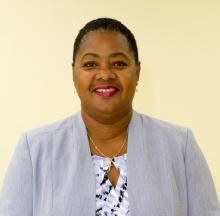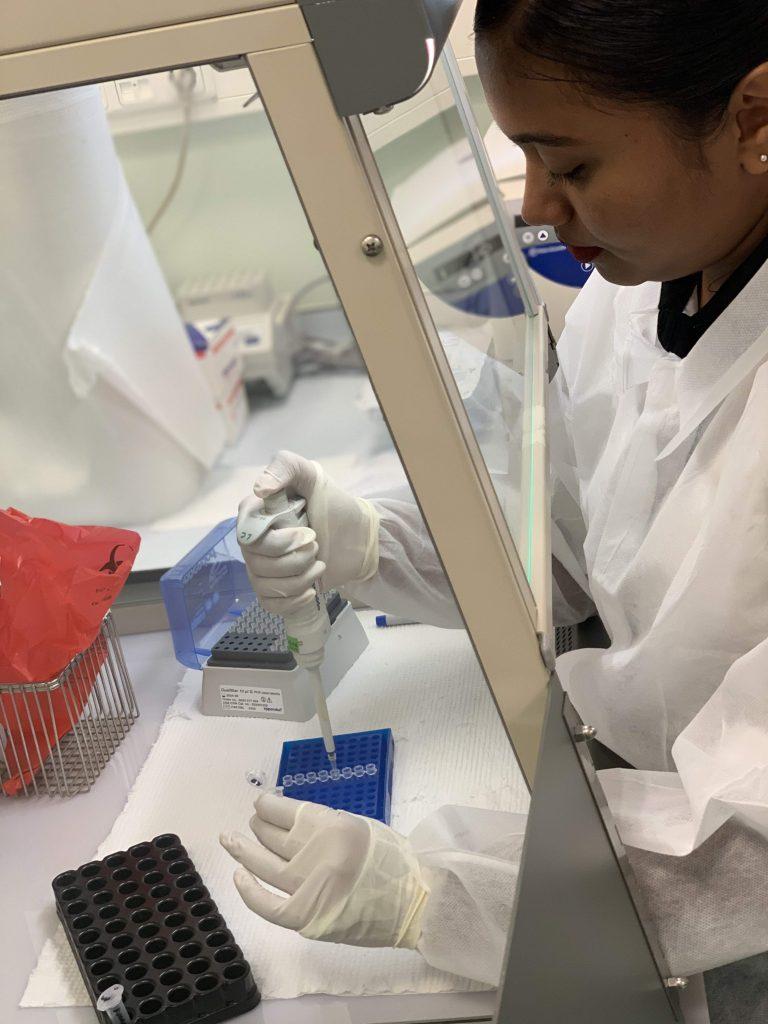COVID-19 highlighted the urgent need to strengthen Suriname’s health system. The Government is taking steps to ensure that the whole population can access essential health services during the COVID-19 pandemic and beyond.
Suriname is seizing the opportunity to build a stronger health system that is more resilient to shocks so it can provide services to everyone, including the most remote and vulnerable populations.
The Government’s strategic approach in responding to COVID-19 aims to save lives and address urgent needs while building a strong foundation to achieve universal health coverage.
The Ministry of Health and PAHO/WHO have together developed strategies and guidelines in four main areas: saving lives, protecting health care workers, slowing the spread of the virus and strengthening epidemic intelligence.

“In Suriname, the models used to provide health services in the coastal plains and in the interior reflect the specific needs of the populations in those areas. They re-emphasize the need to further invest in primary health care and to use innovative models of comprehensive and timely service delivery to ensure that no one is left behind."
THE LONG READ
About 90% of Suriname’s landmass is characterized as tropical rainforest. Deep in the midst of the rainforest, swampy plains and unexplored mountains live remote indigenous communities who are vulnerable to a number of health issues. In these areas, primary health care is the first and sometimes the only option. Reaching remote communities is just one of the many challenges that Suriname faces. COVID-19 has further exposed critical gaps in its health system. The country has a limited number of health workers with just eight physicians and 23 nurses per 10,000 people. Few medical specialists or nurses are trained to support Intensive Care Units. The health system infrastructure needed to maintain essential public health functions is still under development.

COVID-19 arrived when the country was just beginning to review the regulation, procurement and management of medicines and medical technologies and to develop a national health information system to improve decision-making. Suriname does not have much experience in tackling emergencies. Except for flooding, it is not at risk for natural disasters. So its capacity to implement the International Health Regulations (IHR, 2005) to help with emergency preparedness and response is also limited. Now that most resources are focused on the COVID-19 response, the country is fighting to maintain essential health services and continuity of care throughout the whole country, including to populations in remote areas.

Responding to COVID-19
Suriname is determined to succeed. In January 2020, when the world became aware of the threat of COVID-19, Suriname’s Ministry of Health convened a Public Health Response team headed by the Director of Health. It started developing standard operating procedures aligned with the country’s pandemic influenza preparedness plan. Together, PAHO/WHO and the Ministry of Health developed guidelines for quarantine management, monitoring of ports of entry, protocols for early detection and screening and clinical management.
Reaching remote communities is just one of the many challenges that Suriname faces. COVID-19 has further exposed critical gaps in its health system.
The first case of COVID-19 was confirmed on 13 March with only ten cases identified by 28 March. After a 49-day lull in reported cases between 28 March and 16 May, Suriname was poised to relax public and social measures. However, the number of new cases started to rise in late May.
In addition to the health sector response, the Government set up a national COVID-19 Management Team under the office of the Vice President to oversee the emergency preparedness and response and engage various sectors and partners. The country now has a COVID-19 National Preparedness and Response Plan and has identified the technical and financial support that are required for an effective health sector response.
UHC Partnership support for COVID-19
Since the start of 2020, WHO, through the UHC Partnership, has expanded its support to strengthen Suriname’s health system with the goal of helping the country achieve universal health coverage, and now working in the context of COVID-19. With funding from the European Union, the Grand Duchy of Luxembourg, Irish Aid, the Government of Japan, the French Ministry for Europe and Foreign Affairs, the UK Department for International Development and Belgium, the Partnership is building on activities previously carried out by PAHO/WHO that need additional resources to continue or scale up.
Work has been in four main areas:
1. Saving lives
PAHO/WHO assisted the Ministry of Health to prepare for COVID-19. Support was provided in assessing the readiness of hospitals nationwide to check for gaps in coordination, infection prevention and control, and human resource allocation. Guidance was also provided on the clinical management of COVID-19 and the re-organization of health services for surge capacity. PAHO and the Ministry used forecasting tools to estimate the essential supplies and capacity needed to effectively respond to COVID-19, including the growing need for health workers.
2. Protecting health workers
PAHO/WHO has provided technical guidance on infection prevention and control and on the provision and use of Personal Protective Equipment for health workers. Three OpenWHO COVID-19 online courses were translated into Dutch to make them more accessible to all health workers in Suriname now that training sessions need to be held virtually.
Suriname is determined to succeed. In January 2020, when the world became aware of the threat of COVID-19, Suriname’s Ministry of Health convened a Public Health Response team headed by the Director of Health.
3. Slowing the spread
PAHO/WHO has provided significant guidance to the Ministry of Health on case detection, contact tracing, isolation and quarantine. The PAHO Suriname country office visited a proposed alternative medical care site for the management of over 100 mild COVID-19 patients and made recommendations on the flow of patients, the space needed to maintain infection prevention and control and the allocation of space for health workers and managing supplies.
4. Epidemic intelligence
PAHO/WHO provided guidance on establishing an emergency operations centre, and provided equipment and supplies including laptop computers, mobile phones, logistics management tools, among others. Through WHO’s support, Suriname was the first country in the Caribbean to use go.data – a WHO/GOARN web-based outbreak investigation tool – to track and report basic data on suspected and confirmed COVID-19 cases and deaths disaggregated by age, sex and location. Suriname is now looking to enable other partners to use this system, especially in interior areas where contact tracing is even more challenging. PAHO/WHO has provided test kits, reagents and consumables to the designated COVID-19 laboratory in the country and continues to update the skills of laboratory personnel.


Meanwhile, the Suriname PAHO/WHO country office has, on request from the Ministry of Health, coordinated risk communication and community engagement work. PAHO/WHO colleagues have worked closely with country partners including other UN agencies and NGOs to develop and produce print and electronic media materials to communicate effectively with vulnerable groups including those with non-communicable diseases and mental health disorders. PAHO/WHO in Suriname has worked hard to ensure that these vulnerable groups, including those living in the interior, are specifically targeted with appropriate materials in their own language.
“In Suriname, the models used to provide health services in the coastal plains and in the interior reflect the specific needs of the populations in those areas. They re-emphasize the need to further invest in primary health care and to use innovative models of comprehensive and timely service delivery to ensure that no one is left behind. COVID-19 demonstrates this as the economic and social situations in the border communities with French Guyana and Brazil puts those areas at highest risk of transmission of the disease and consequently to the whole country,” said Dr Karen Lewis-Bell, PAHO/WHO Representative in Suriname.

The future of public health in Suriname
The Government’s experience in preparing for COVID-19 and its urgent actions to keep its population safe have also brought a unique opportunity to chart a new path for public health in the country.
Looking forward, PAHO/WHO will continue to support Suriname in strengthening its capacity in health emergency preparedness beyond COVID-19. As this requires robust cross-sectoral engagement and collaboration, PAHO/WHO will support multi-sectoral coordination so that Suriname can develop and maintain capacities to prevent, detect and respond to future outbreaks, epidemics and pandemics.
“In Suriname, the models used to provide health services in the coastal plains and in the interior reflect the specific needs of the populations in those areas. They re-emphasize the need to further invest in primary health care and to use innovative models of comprehensive and timely service delivery to ensure that no one is left behind."
Dr Karen Lewis-Bell, PAHO/WHO Representative in Suriname
Suriname is learning from its response to COVID-19 and is preparing to rise from the pandemic with a stronger, more resilient health system that leaves no one behind.

